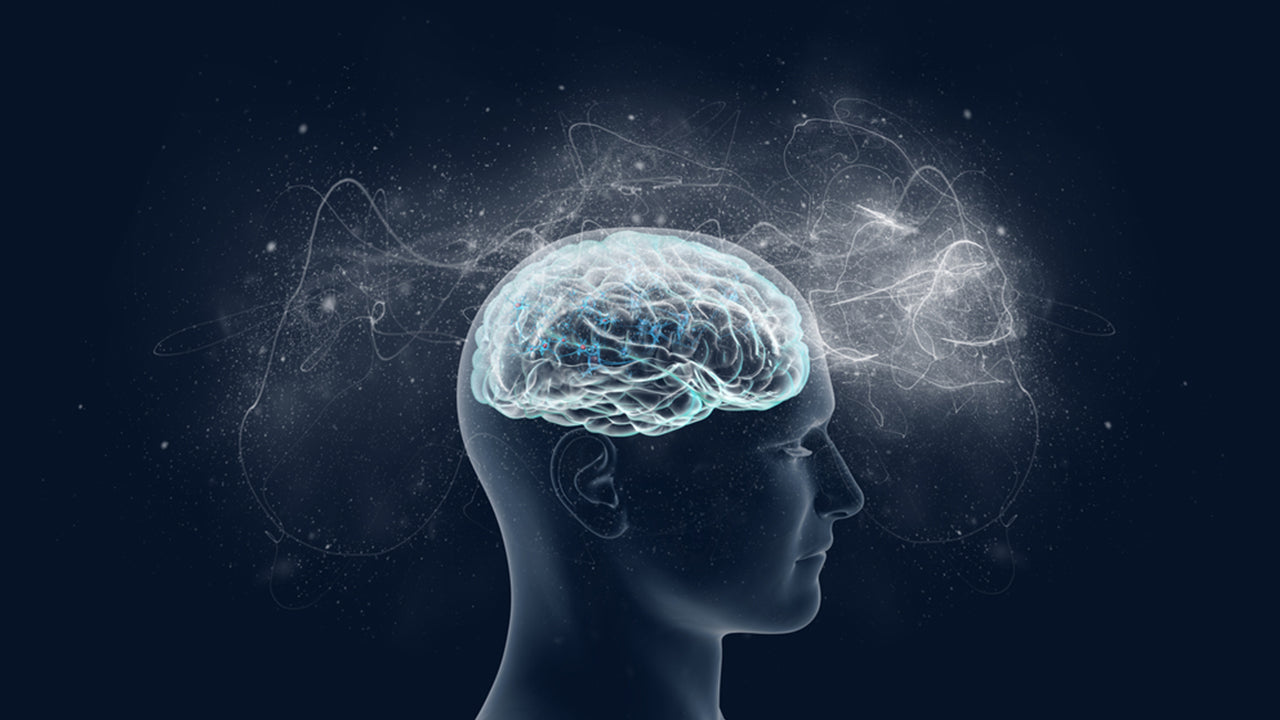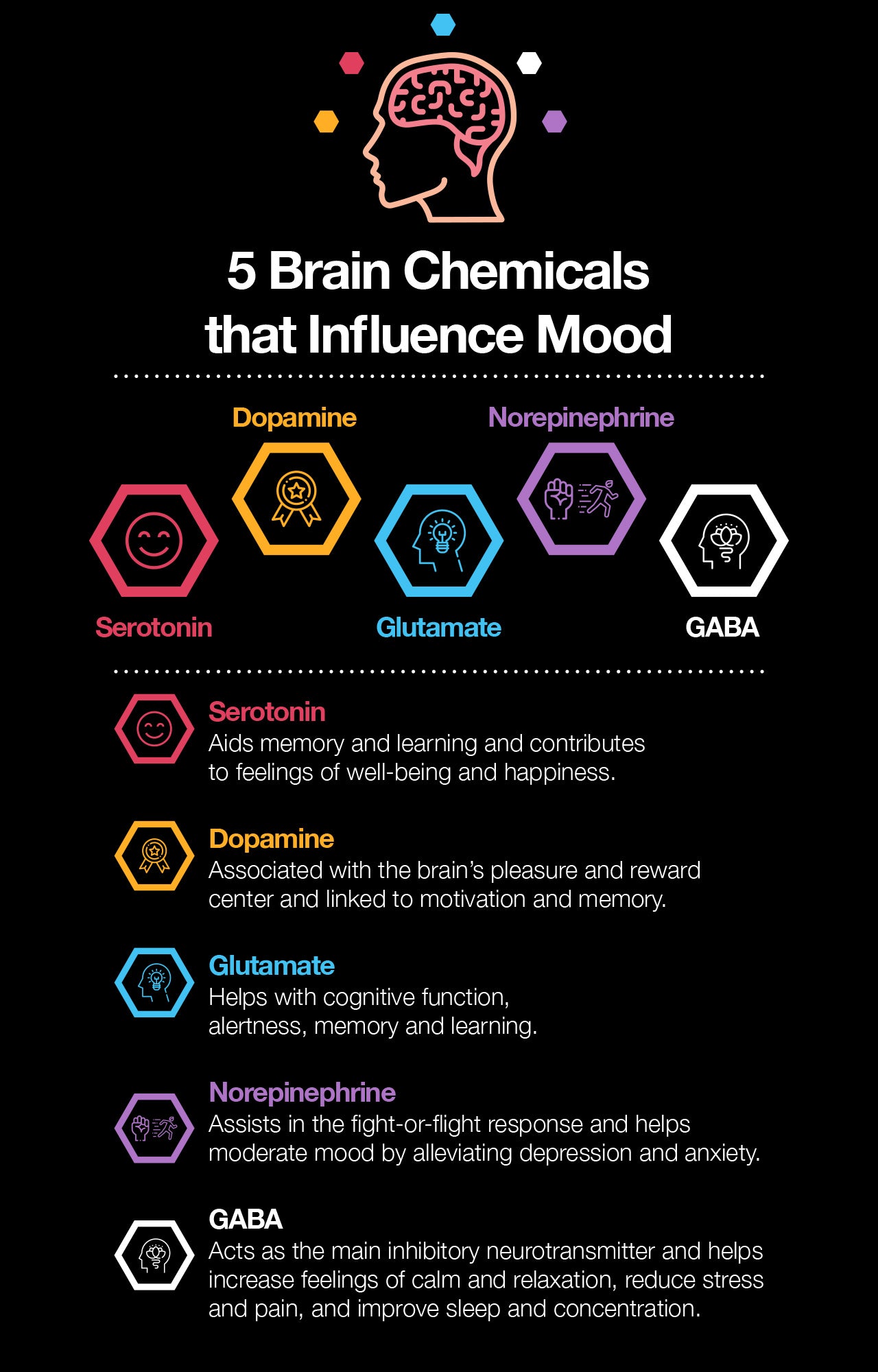How Brain Chemicals Affect Emotions: Neurotransmitters and Mood Regulation
 By: by Amino Science
By: by Amino Science

The human brain is a multifaceted organ with an extensive network of connections and pathways that work together so we can think, feel, and react. And all of this is made possible by the actions of brain cells called neurons, which communicate with one another using chemical messengers called neurotransmitters. Without this complex interplay of nerve cells and neurotransmitters, the brain—and by extension the body—wouldn’t be able to function, and everything that makes us who we are would cease to be. Yet of all the parts played by the brain in its capacity as the body’s mainframe, perhaps one of the most interesting is its role in the generation of emotions. So in this article, we’re going to dig deeper into this topic and discuss how brain chemicals affect emotions.
A Look Inside the Brain
Right now, as you sit reading this article, many of your brain’s approximately 100 billion neurons are hard at work, helping to coordinate everything from the brain regions responsible for interpreting the text to the movement of your eyes as they travel from word to word to that voice in the back of your mind, debating whether to get up for another cup of coffee.
The right and left hemispheres of the brain may process all this information in slightly different ways, but both sides ultimately work in concert to assimilate data and convert it into electrical impulses that influence how you think, feel, and react.
How Brain Chemicals Affect Emotions
Whether you’re thinking, moving, or sensing the environment around you, your neurons are communicating with each other to coordinate your thoughts, actions, and sensations. Indeed, the brain’s neurons—and their chemical messengers—are responsible for processing every last bit of information that comes into and goes out of the brain.
So everything you experience, including your emotions, is the result of the interactions between perhaps as many as 10,000 different types of neurons—not to mention the estimated 100 neurotransmitters that make up your brain chemistry.
But of all these chemical messengers, five are especially notable for their effects on emotion and their roles in influencing how you feel. These are:
- Gamma-aminobutyric acid (GABA)
- Serotonin
- Dopamine
- Glutamate
- Norepinephrine
GABA
GABA is the main inhibitory neurotransmitter of the central nervous system (CNS) and plays a crucial role in reducing the activity of your neurons. This inhibitory action, in turn, leads to increased relaxation and calm, reduced stress and pain, and improved sleep and concentration.
In addition, GABA is involved in the immune and endocrine systems as well as the digestive tract and helps influence appetite, metabolism, motor control, and vision. Low levels of this important neurotransmitter have also been linked to mood swings, anxiety, depression, and insomnia.
Serotonin
Serotonin is the brain’s “happy” neurotransmitter and is tied closely to both learning and memory. Although serotonin is found in the CNS, an estimated 90% of it is actually produced in the digestive tract. In fact, low serotonin levels are linked to gastrointestinal issues, such as irritable bowel syndrome (IBS).
While this neurotransmitter helps contribute to feelings of happiness, contentment, and calm, low levels of serotonin can lead to symptoms of depression, anxiety, and anger as well as insomnia and decreased self-esteem. Serotonin also helps normalize the body’s internal clock, or circadian rhythm, and functions as a precursor of melatonin, which is important for helping you get to sleep at night.
The neurotransmitter is also involved in the regulation of sexual function, appetite, judgment, and social behavior. And studies have indicated that serotonin is one of several neurotransmitters involved in the formation of new neurons.
Dopamine
This neurotransmitter, which is also considered a hormone, is associated with the brain’s pleasure and reward system. In other words, dopamine helps motivate us to continue behaviors that result in some kind of reward, like eating and drinking—though it can inadvertently reward negative behaviors, such as drug addiction, as well.
Dopamine also plays a large role in controlling how our bodies move, which is why low levels are associated with Parkinson’s disease symptoms. In addition, low levels of dopamine are associated with mood disorders like depression as well as insomnia and low self-esteem.
Glutamate
Glutamate is both a nonessential amino acid and the brain’s most abundant excitatory neurotransmitter. It’s also considered something of the mirror image of GABA.
Though glutamate is important for both learning and memory, too much can cause excitotoxicity and cell death, both of which have been implicated in the development of neurodegenerative disorders like Alzheimer’s disease.
By contrast, low levels of glutamate can lead to insomnia, problems with concentration, and mental fatigue. A number of mental health disorders, including schizophrenia, obsessive-compulsive disorder (OCD), depression, and autism, have also been attributed to imbalances in glutamate production.
Norepinephrine
Like dopamine, norepinephrine acts as both a neurotransmitter and a hormone. While low levels of norepinephrine are associated with anxiety, depression, fatigue, decreased levels of alertness, and difficulty concentrating, this particular chemical messenger is probably best known for its role in the fight-or-flight response.
During a fight-or-flight situation, norepinephrine—in combination with adrenaline or epinephrine—increases breathing and heart rate, blood pressure, and alertness; triggers the release of glucose; causes vasoconstriction of the blood vessels; decreases the amount of blood going to the intestines; and increases blood flow to the skeletal muscles.

Balancing Brain Chemistry
For the neurotransmitters in our brains to function at optimal efficiency, our diets must contain plenty of protein—specifically amino acids, the building blocks of protein. If our diets are lacking in these important building blocks, our brains may not be able to produce all the neurotransmitters we require, which can throw our brain chemistry off balance.
Additional factors such as unhealthy food choices, drug use, chronic stress, and genetic predisposition to certain chemical imbalances may only compound the problem.
Signs your neurotransmitters are out of balance include:
- Fatigue
- Insomnia
- Depression
- Anxiety
- Brain fog
- Addiction
However, there are several diet and lifestyle changes that can help balance the brain and improve mood and overall well-being.
Reduce Stress
It’s a well-known fact that stress can be dangerous to our health and negatively impact both physical and emotional well-being. Stress—especially prolonged stress—can quickly zap our neurotransmitters, leaving us lethargic, distracted, and just plain depleted. So it’s critical that we protect ourselves by reducing our stress levels.
Thankfully, there are many things we can do to effectively reduce stress—including exercise, meditation, deep breathing, yoga, and even hobbies—so you should have no trouble finding something that works for you. Just remember that you’ll get the best results if you practice your chosen method (or methods) on a regular basis.
Eat a Healthy Diet
As discussed earlier, neurotransmitter production is dependent on proper nutrition, so brain function is directly impacted by the dietary choices we make. For example, the healthy fats provided by omega-3 fatty acids assist in neurotransmitter production and neuronal communication. Moreover, levels of specific neurotransmitters can be raised or lowered by eating certain foods.
If you want to boost serotonin levels, choose salmon, turkey, tofu, spinach, eggs, flaxseeds, or dark chocolate.
Dopamine is easily oxidized by free radicals, so choosing plenty of antioxidant-rich foods, such as fruits and green, leafy vegetables, can help increase levels of this important neurotransmitter. Dopamine levels can also be increased by eating more grass-fed dairy products, berries, pumpkin seeds, almonds, and bananas.
Glutamate can be found in a variety of protein-rich foods, including Parmesan cheese, cured meats, seafood, cheddar cheese, and soy products as well as tomatoes, corn, and walnuts.
To support norepinephrine levels, start by eliminating artificial sweeteners, as these products can affect the balance of catecholamines in the brain (this would include dopamine as well). Also include plenty of tyrosine-containing foods—almonds, bananas, avocados, dairy products, and sesame seeds all help boost levels of norepinephrine in the brain.
The foods we eat can either replenish or deplete our neurotransmitter levels, so remember to skip the donuts and french fries and choose fresh fruits and vegetables, lean protein, whole grains, and healthy fats instead.
Exercise Regularly
There’s no question that exercise does a body good, and one of the reasons for this is its effect on brain chemicals. Physical activity not only stimulates the release of pain-relieving endorphins, but it also encourages the release of dopamine, norepinephrine, and serotonin, all of which can help in the regulation of emotions.
Add Supplements
To help complement your diet and ensure you’re getting all the important nutrients your brain needs, consider dietary supplements. For example, the minerals zinc and magnesium as well as the B vitamins and antioxidant vitamins A, C, and E are all necessary for proper neurotransmitter function.
Amino acid supplements that include vitamin and mineral cofactors can also be used to help restore neurotransmitter equilibrium and promote a balanced mood and increased sense of well-being.
By recognizing the symptoms associated with neurotransmitter imbalances and making just a few simple lifestyle changes, you can help correct these imbalances and stabilize your mood. What’s more, every time you take steps to support healthy brain function, you create new neural pathways that further reinforce your positive choices, which leads to a greater sense of well-being and improved quality of life.

Up to 25% off Amino
Shop NowTAGS: natural cures
Join the Community
Comments (0)
Most Craveable Recipes




 833-264-6620
833-264-6620



















